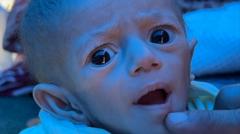The camera glides across a landscape of despair, capturing faces that convey no joy but instead reflect the reality of survival amidst death. The haunting silence of children used to the chaos of life among the dying tells a chilling story. They stand in long queues, waiting for dwindling resources that rarely arrive.
This scene is set against a backdrop of continuous conflict lasting 19 months, now exacerbated by an intensified Israeli military campaign. A local cameraman bravely documenting their plight chose to remain unnamed for safety reasons, yet his heart beats in rhythm with the desperate cries of survivors, tirelessly echoed in hospital courtyards.
On a day marked by desperation, he seeks the whereabouts of Siwar Ashour, a five-month-old girl whose frail frame caught his attention at Nasser hospital in Khan Younis earlier this month. She weighed only 2kg when he last saw her, far below the average weight for a baby of her age.
Siwar's struggle post-hospital discharge is critical; she requires special formula due to an allergy, which remains hard to secure amid logistical nightmares caused by the blockade. The cameraman ventures into the shattered streets filled with makeshift shelters in search of her.
Days ago, in a bleak chat, he expressed sheer hopelessness, revealing fears about the announced evacuation orders placed by the Israeli army in Khan Younis. Overcrowding is rampant in refugee shelters, and the uncertainty looms heavy.
He eventually finds Siwar in a tiny one-bedroom shack, where her mother Najwa and grandmother Reem fiercely protect her amidst their own suffering. The grim conditions force Najwa to cover Siwar from flies, as the scarcity of the special milk formula begins to weigh heavily on their survival.
Najwa, just 23, recounts how her daughter improved temporarily while in the hospital. However, the baby’s circumstances have once again worsened; her weight continues to decline with only a can of formula left. Lamenting their reality, Najwa reveals their depriving struggle for survival amidst the horror of war.
Soundscapes of bombing reverberate throughout their lives, haunting even baby Siwar, who instinctively cries out at the sound of approaching conflict. Najwa recalls struggles with breastfeeding due to malnutrition, a fate echoed by many young mothers in her situation.
While Israel insists there is no food shortage in Gaza, testimonies from aid agencies and international entities sharply contradict this claim, emphasizing the humanitarian disaster unfolding in this enclave. UN Secretary General Antonio Guterres characterizes the scant aid allowed in as woefully inadequate, likening their situation to "the cruellest phase of this cruel conflict."
Caught between constant warfare and the fight for basic necessities, Najwa expresses a painful resignation, stating, "There is only the present moment and how to survive it," encapsulating the despair that envelopes every aspect of life in Gaza. The agony of 2.1 million residents remains a heart-wrenching reality as they navigate this perpetual struggle for existence.















